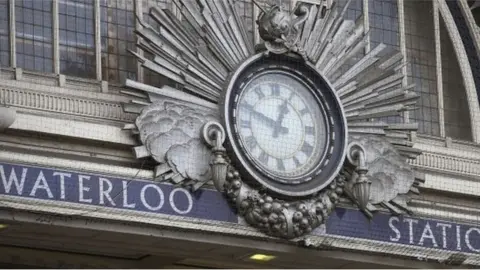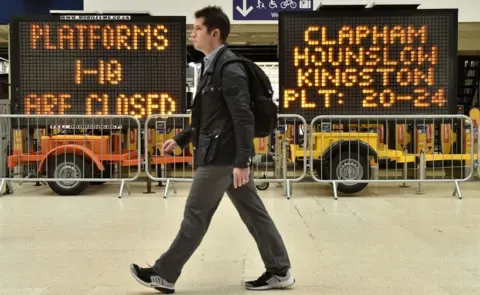Waterloo station works: Compensation and other questions
The UK's busiest railway station is in the midst of a huge engineering project - but what does this mean for passengers?
The £800m overhaul at London Waterloo has closed half of the platforms and diverted many of the 270,000 journeys made back and forth each day.
The work, expected to last three-and-a-half weeks, is to expand the station to take 30% more passengers at peak times.
Here are answers to some of the questions online readers asked us.

Why aren't season ticket holders being offered compensation for the disruption?
South West Trains (SWT) said it did not offer compensation ahead of the work because it had put measures in place to reduce the likelihood of major delays.
During the engineering works all passengers are entitled to compensation as they are any other day of the year.
But claims for delays will be judged against the published temporary timetable for August, not the standard timetable that season ticket holders may be used to travelling by.
If disruption is particularly severe, SWT can declare a 'void day' when refunds are available for day tickets and season ticket holders will be compensated on renewal.
The passenger's charter has all the details of how to make a compensation claim.

How much longer will the platforms be and how many extra carriages will be on each train?
Each platform will be extended by around 40 metres so that the number of carriages that can stop there can increase from eight to 10.
These longer trains will run from the end of this year on platforms one to four.
The whole project will put 30 new trains into service providing 150 extra carriages.

 PA
PA
Why are engineers not working 24/7 to get it finished quicker?
They are. Work started at 01:00 on Saturday, 5 August and about 1,000 people are working 24 hours a day to get it finished in the early hours of Tuesday, 29 August.

What impact has the work had on the rest of London's transport?
Transport for London said other buses and trains were "busy but not significantly" busier than expected during the school holidays.

Are any platforms going to be raised?
The answer is no, according to Owen Johns at Network rail.
"The country's railway network has been built over the last couple of centuries with different height platforms and it is not feasible to retro-fit the thousands of stations around the country," he said.

 PA
PA
Why has it taken 10 years for the Eurostar platforms to be brought into service?
It was not a simple case of just running trains into the platforms - the International Terminal has been completely redeveloped, said Mr Johns.
Much of the work has now been completed and trains are able to run this August, but work will continue until December 2018, he said.
Eurostar trains are 18 carriages long, but nothing that long runs on domestic services, and only six Eurostar trains were able to run to and from the International Terminal every hour, he said.
"So, we have already shortened the platforms and installed new sections of track which means we can now run 18 trains per hour into the International Terminal, which is much more suited to a high frequency metro-style service that runs between Waterloo and Windsor/Reading," he said.